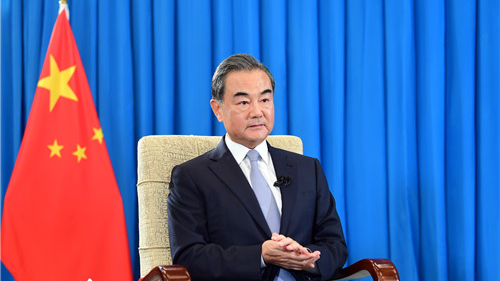Editor's note: Stephen Ndegwa is a Nairobi-based communication expert, lecturer-scholar at the United States International University-Africa, author and international affairs columnist. The article reflects the author's opinions and not necessarily the views of CGTN.
America, under President Donald Trump, has been spoiling for a fight. No one can really lay a finger on America's specific grievances. Trump seems to be aiming at anything that moves, and is sulking perennially at alleged unfairness from various countries, establishments and organizations.
Trump has few friends. Everyone is in fair game in his quest for reinstating America's hegemony. Even America's traditional allies seem to have gotten cold feet, and are heeding some of his calls simply as a face-saving gesture, rather than full commitment in his cause.
Indeed, the U.S. president has been spoiling for a fight. But it is a fight that he is playing the role of both aggressor and victim. But even as he fires salvos at all and sundry, he has saved the best for last – a Cold War fight with China.
For some reason, China seems to give Trump "nightmares," like someone transfixed on a rail track as a train speeds head-on from a distance. But Beijing has made it clear that it is not interested in a cat-fight with Washington D.C., particularly at this time when the two should be reading from the same script in the war against the COVID-19 pandemic.
In an exclusive interview with Xinhua News Agency on Wednesday, Chinese State Councilor and Foreign Minister Wang Yi called for a recalibration of the two sparring partners, stressing that they needed each other more than any of them going it alone.
"China rejects any attempt to create a so-called 'new Cold War,' because it contravenes the fundamental interests of the Chinese and American peoples and the global trend toward development and progress."
The U.S. has been deluded for a long time that all countries aspire to be like it in all ways. The truth is that some countries are not wannabes. In his interview, Wang made it clear that China is comfortable in its skin, and does not seek to engage in some kind of competition of who has the best system – ostensibly between capitalism and socialism.

Chinese State Councilor and Foreign Minister Wang Yi talks in an exclusive interview with Xinhua News Agency on August 5, 2020. /fmprc.gov.cn
Chinese State Councilor and Foreign Minister Wang Yi talks in an exclusive interview with Xinhua News Agency on August 5, 2020. /fmprc.gov.cn
To Trump, China's loss would be America's gain. By spoiling China's relationship with its major trading and diplomatic partners, Trump feels that he can step in and pick the spoils of such an eventuality to support his interests around the world, or recoup lost ground.
Further, Trump does not mind playing a dog in the manger in a bid to sabotage the interests of its avowed "adversary." One defining factor of Chinese diplomacy is its genuine interest in the affairs of friends and partners. The U.S. largely lacks such mutuality in its engagements, with "America First" as a clear testament of this hitherto covert "modus operandi."
The Cold War rivalry between the United States and the Soviet Union that arose after the World War II was largely based on the military might of the two nations and their allies. Both countries were nuclear powers, and each did not miss an opportunity to flex its muscles during either ideological or political conflicts.
None of the two parties can claim to have benefited from the tension in the foregone era. Moreover, poor countries suffered the most as they were used as pawns in a deadly game, whose outcome would have been the annihilation of mankind. Everybody would have lost everything.
A second cold war pitting America and China would be different, albeit all encompassing. Both superpowers are almost at par in every other sector, unlike in the previous case where America's economic might was largely unsurpassed.
China's socialist system with Chinese characteristics has bestowed the country with the better of two worlds. On one side is a capitalist market economy that has risen to second position in a span of 40 years. On the flip side is a socialist mode of governance that has helped to lift almost all the country's citizens from poverty.
With such a multi-faceted structure, China would be a step ahead in any cold war that seeks to isolate it from ongoing and potentially beneficial partnerships, or cut the tentacles of its multilateralism in geopolitics.
In this kind of environment, America's divide-and-rule tactics cannot go far. China's leadership in handling the COVID-19 pandemic both at home and abroad has actually solidified its international credentials, and entrenched itself deeper into the global psyche.
Tired of playing the hide-and-seek game and other silly games, Wang read the Riot Act to the U.S. In his strong worded interview with Xinhua, the foreign minister was categorical that, "The root cause (of ongoing tensions) is that some American politicians who are biased against and hostile to China are using their power to smear China with fabrications and impede normal ties with China under various pretexts." The U.S. needs to rein in itself.
(If you want to contribute and have specific expertise, please contact us at opinions@cgtn.com)